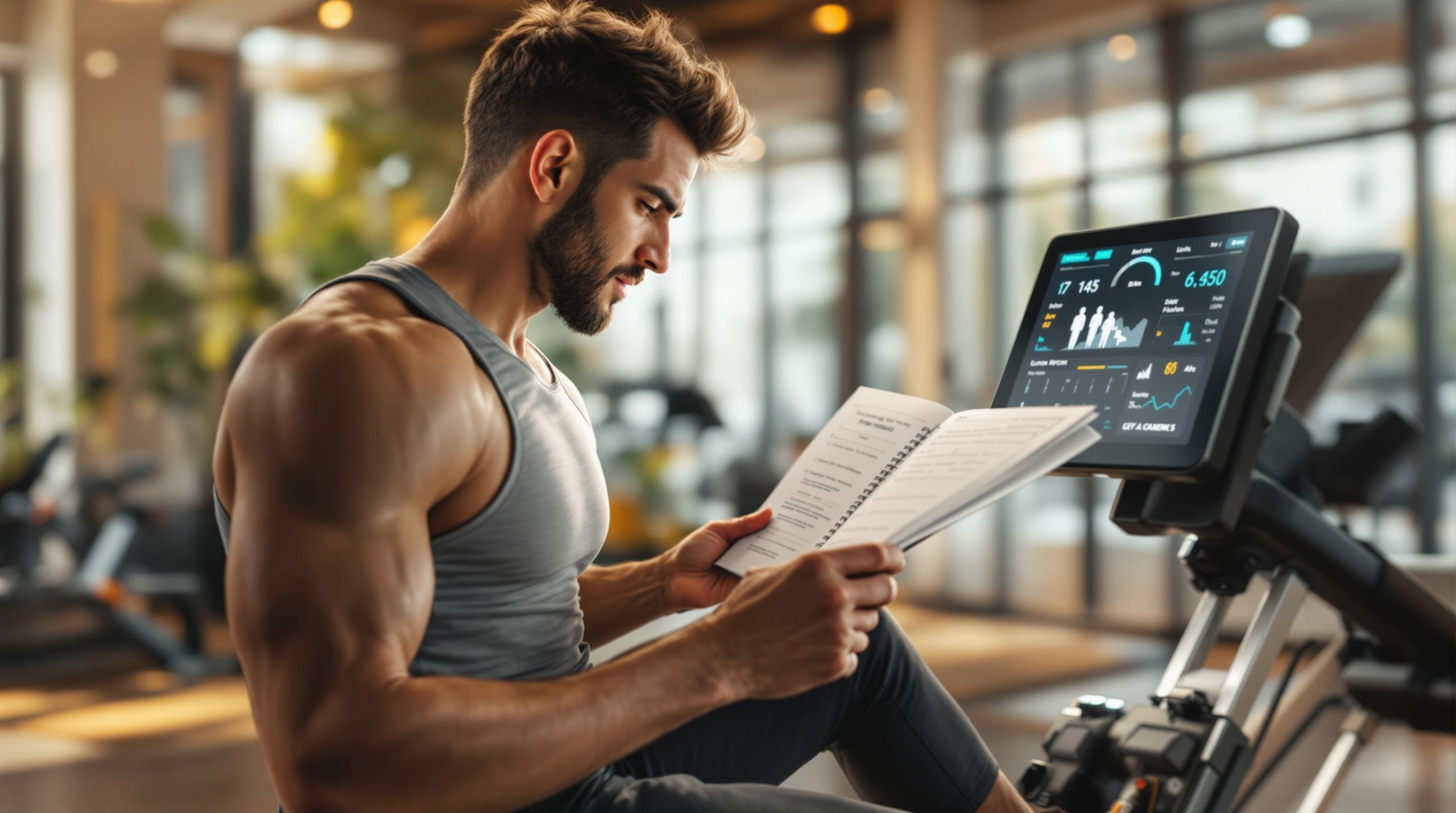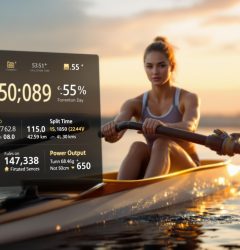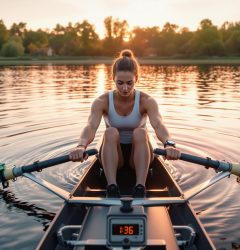01 Feb

Custom rowing workouts let you tailor your sessions to meet specific fitness goals like endurance, power, or calorie burn. Rowing engages 86% of your muscles per stroke and burns 255-440 calories in 30 minutes, depending on intensity. Here’s how to get started:
- Key Components: Focus on stroke rate (20-30 SPM), intensity, duration (20-60 minutes), and rest periods.
- Tools: Use apps like Concept2 Workout Creator, ErgData, or ErgMonkey for workout programming and performance tracking.
- Steps to Create Workouts:
- Define your goal (e.g., endurance, power, calorie burn).
- Structure intervals with warm-up, main sets, recovery, and cool-down.
- Balance rest and vary formats to avoid plateaus.
- Advanced Tips: Pair stroke rate with power, progress gradually, and track metrics like heart rate and split times for improvement.
Quick Comparison of Rowing Tools
| Feature | Concept2 Workout Creator | ErgData | ErgMonkey |
|---|---|---|---|
| Price | Free | Free | From $19.99/year |
| Workout Creation | Basic intervals | Customizable | Advanced planning |
| Data Analysis | Basic metrics | Standard | Detailed analytics |
| Device Compatibility | PM3, PM4, PM5 monitors | iOS & Android | Web-based platform |
| Data Integration | Concept2 Logbook | Concept2 Logbook | Concept2 Logbook & RP3 |
Start by defining your goals, structuring your workouts, and using tools to track progress. With the right approach, you can optimize your training and see measurable results.
How to Set Custom Workouts on the Concept 2 Rower
Choosing Tools for Custom Rowing Workouts
Picking the right tools is key to creating effective workouts and tracking your performance accurately. Rowing apps range from simple trackers to platforms with detailed performance insights.
Popular Tools for Rowing Workouts
The Concept2 Workout Creator is a go-to for many rowers. It integrates with the PM5 monitor, making it easy to program workouts and focus on specific training goals.
ErgData is another option, offering an easy way to program workouts while syncing directly with the Concept2 Logbook for tracking.
For those seeking more detailed insights, ErgMonkey provides features like workout comparisons, heart rate zone tracking, and trend analysis. It also connects with both the Concept2 Logbook and RP3.
Comparing Features of Workout Tools
| Feature | Concept2 Workout Creator | ErgData | ErgMonkey |
|---|---|---|---|
| Price | Free | Free | From $19.99/year |
| Workout Creation | Basic intervals | Custom programming | Advanced planning |
| Data Analysis | Basic metrics | Standard tracking | Detailed analytics |
| Device Compatibility | PM3, PM4, PM5 monitors | iOS & Android | Web-based platform |
| Data Integration | Concept2 Logbook | Concept2 Logbook | Concept2 Logbook & RP3 |
"With all these options for programming workouts on your rowing machine, there’s an endless number of workouts that you can program." – Alicia R. Clark
If you’re unsure where to start, try ErgData’s free features to get a sense of your needs. From there, you can explore advanced platforms like ErgMonkey to design workouts that align with your goals.
Steps to Create Custom Rowing Workouts
Creating rowing workouts that match your fitness goals takes some planning. Here’s a simple guide to help you design workouts that get results.
Step 1: Define What You Want to Achieve
Start by identifying your main goal – whether it’s building endurance, increasing power, or burning calories. Each goal requires a different approach:
- Endurance: Row at 18-20 strokes per minute (SPM) at 60-65% effort for 5-10 minutes.
- Power: Use 24-26 SPM at 80-85% effort for 1-3 minutes.
- Calorie Burn: Combine various intensities, rowing at 20-24 SPM for 2-5 minutes.
Tools like Concept2 Workout Creator or ErgMonkey can help you craft and monitor workouts tailored to these goals, ensuring you stay on track.
Step 2: Structure Your Workout Intervals
A well-structured workout includes a warm-up, goal-focused intervals, recovery periods, and a cool-down:
- Warm-Up: Start with 5-10 minutes at 14-16 SPM.
- Main Intervals: Follow the pacing guidelines from Step 1.
- Recovery: Take 1-2 minutes of light rowing or rest between intervals.
- Cool-Down: End with 5 minutes at 16-18 SPM.
"Start with 2:30 work intervals and 0:30 rest intervals. Aim for 30 minutes total time (10 work intervals)." – Dick from the Concept2 Team
Step 3: Balance Rest and Keep It Interesting
Rest is key to avoiding burnout and improving performance. To stay motivated and avoid hitting a plateau, mix things up:
- Alternate between high-intensity and low-intensity workouts.
- Use a 2:1 work-to-rest ratio for balanced recovery.
- Try different formats like steady-state rows, intervals, or pyramid-style workouts.
- Keep an eye on your heart rate to ensure you’re training at the right intensity.
"Remember that more isn’t always better when it comes to your workouts." – Concept2 Training Guidance
Once you’re comfortable with these basics, you can start experimenting with more advanced training techniques to push your progress further.
sbb-itb-1725142
Advanced Customization Techniques
Fine-tuning your rowing workouts means learning how to adjust key variables to hit specific performance goals. Let’s dive into some advanced strategies that can take your training to the next level.
Using Stroke Rate and Power for Precision
For experienced rowers, it’s not just about hitting a stroke rate – it’s about pairing it with the right intensity. Aligning your stroke rate with your training goals while keeping proper form is crucial. As Coach Neil Bergenroth explains:
"You have a certain finite number of truly ‘hard’ strokes each week. Therefore, drop the hammer on a Wednesday and work hard for 24 to 30 strokes per minute. Work to maximize your power per stroke."
In high-intensity sessions, focus on quality over quantity. Once you’ve nailed the balance between stroke rate and intensity, you can start layering in progressions to push your training further.
Designing Workouts with Progression
To keep improving and avoid hitting a plateau, progression is key. This involves gradually increasing the difficulty of your workouts while maintaining good form. For example, start with short, intense intervals like 3×60 seconds with 5-minute rests. Over time, extend the intervals and adjust rest periods.
Stick to the 80/20 rule: spend 80% of your training time on low-intensity, technique-focused work and 20% on high-intensity sessions. This balance helps you build both endurance and power while reducing the risk of overtraining. A well-structured progression plan lets you customize your workouts to match your goals.
Workouts for Specific Goals
Achieving different goals requires tailored training methods. Tools like ErgMonkey or Concept2’s ErgData app can help you track your progress and stay on target.
For endurance, try this interval setup:
"Row for 30 minutes, changing stroke rate every three minutes: 3’@20 spm, 3’@22 spm, 3’@24 spm, 3’@26 spm, 3’@28 spm, 3’@29 spm, 3’@27 spm, 3’@25 spm, 3’@23 spm, 3’@21 spm."
To develop explosive power, work on "stroke rate tens." Take ten strokes every minute at 4 SPM above your steady-state pace. This approach builds strength while keeping your technique sharp.
Tracking and Reviewing Your Workouts
Keeping tabs on your performance is key to improving your rowing sessions and making steady progress.
Uploading Workouts to Rowing Machines
Tools like Concept2 Workout Creator and ErgZone let you create and upload custom workouts directly to your PM5 monitor. These tools help you stick to specific goals with features like stroke rate and power targets. Once your workout is loaded, the next step is tracking your performance during the session.
Tracking Metrics During Workouts
Monitoring your stats in real time helps you stay on track with intensity and maintain proper form. Here are the key metrics to focus on:
| Metric | Purpose | Target Range |
|---|---|---|
| Heart Rate | Manage training zones | Varies by workout type |
| Stroke Rate | Maintain rhythm and efficiency | 20-30 SPM for most workouts |
| Power Output | Track work intensity | Depends on training goals |
| Split Time | Ensure pace consistency | Varies with workout phase |
"Rowing allows coaches to develop different energy systems – alactic, aerobic, and anaerobic. It really depends on the needs of your athletes and what you want to achieve." – TrainHeroic [1]
Analyzing Data for Better Results
Modern tools make analyzing your performance easier than ever. Platforms like ErgMonkey not only help you design workouts but also provide detailed data insights, such as heart rate zone analysis, trend tracking, and session comparisons. These insights help you fine-tune your training plan.
Use data to track and improve:
- Compare results from similar workouts
- Pinpoint areas that need improvement
- Keep an eye on recovery and overall progress
Conclusion: Building Better Rowing Workouts
Putting together effective rowing workouts takes careful planning, the right tools, and a focus on analyzing performance data. Tools like Concept2 Workout Creator and ErgZone make creating workouts easier, while ErgMonkey provides detailed analytics to help fine-tune your training. By combining these tools with proven training methods, you can take your rowing to the next level.
Advancements in technology have brought precision and measurable progress to rowing workouts. To get the most out of your training, focus on these key elements:
| Training Component | How to Apply | What It Achieves |
|---|---|---|
| Workout Design | Set specific stroke rates (20-30 SPM) and power targets | Improves technique |
| Progress Tracking | Keep an eye on heart rate zones and split times | Boosts performance |
| Data Analysis | Regularly compare workouts and track trends | Helps refine training plans |


